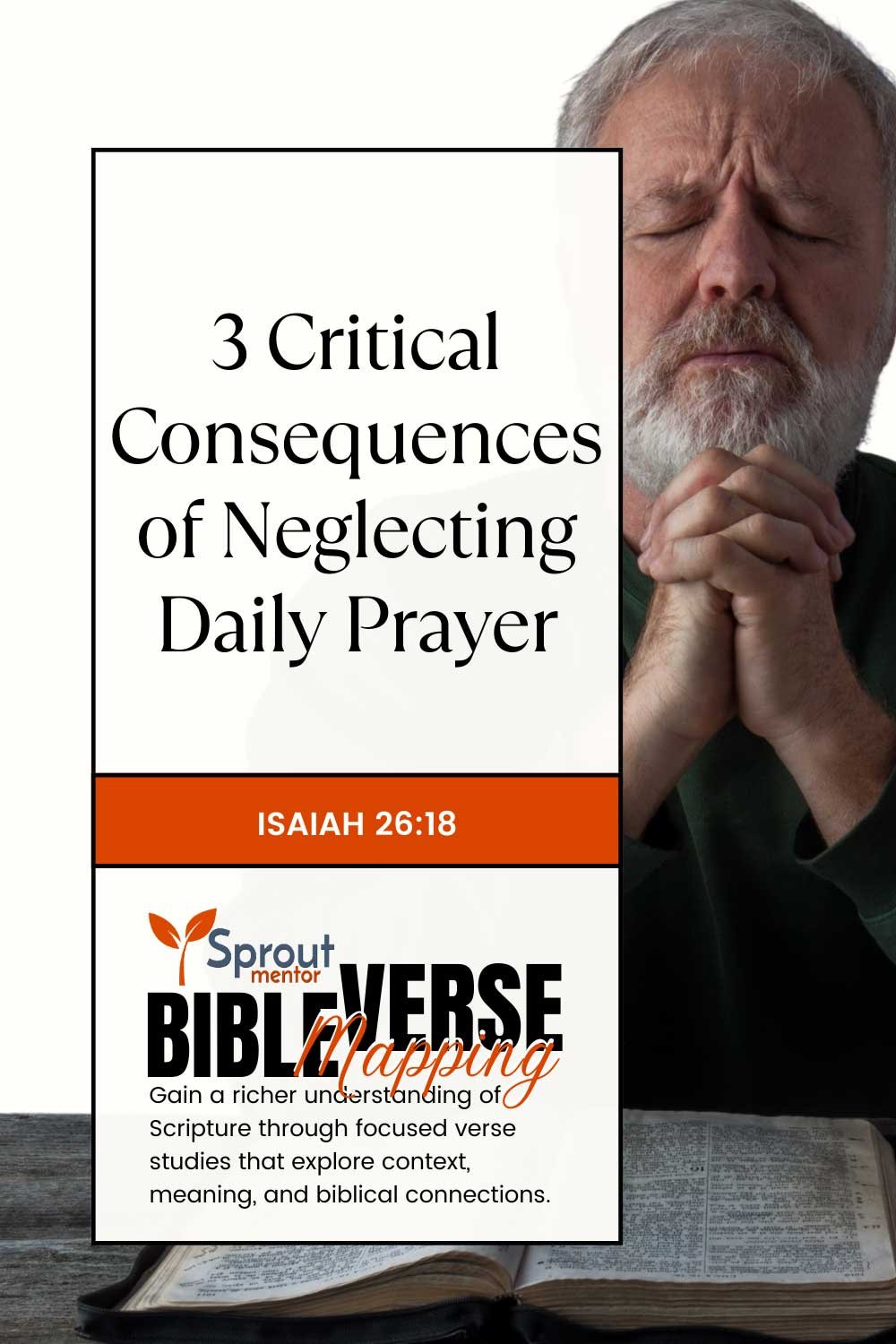7 Sins That Block Your Prayer Life (Romans 3:23)

Share This Blog Post On:
Facing unseen battles in your daily life? We equip you with biblical truth and practical strategies to stand firm against spiritual opposition. Join us for insights on spiritual warfare and strength for your faith journey. Click here to armor up and walk in victory, one truth at a time!
“For all have sinned, and come short of the glory of God.” (Romans 3:23, KJV)
As believers, we often wonder why our prayers sometimes seem to go unanswered. Why does heaven feel closed – occasionally feel like brass, unmoved by our earnest petitions? The answer, more often than we might like to admit, lies within us. The apostle Paul’s profound statement in Romans 3:23 reveals a fundamental truth about humanity – we all fall short of God’s glory through sin. This universal condition affects every aspect of our relationship with God, including making our prayers stinky.
Prayer is one of the most powerful tools a believer has in their spiritual walk. However, sin can create a barrier between us and God, blocking our prayers from being effective. The Bible clearly states that sin separates us from God (Isaiah 59:2), and without repentance, our communication with Him can be hindered. Below are seven sins that can obstruct your prayer life and what the Bible teaches about overcoming them.
One, Secret Faults
David prayed, “Cleanse thou me from secret faults. Keep back thy servant also from presumptuous sins; let them not have dominion over me” (Psalm 19:12-13). In this prayer, the psalmist reveals that sins can be categorized into two: secret faults and presumptuous sins.
Secret faults are also known as “hidden faults”—sins that are unknown to us but still have consequences. Secret faults include unintentional sins, sins of ignorance, or things we do without realizing they are wrong. Though we may not be consciously aware of them, they still create a spiritual distance between us and God. Just because a sin is hidden from us does not mean it is hidden from God (Hebrews 4:13).
How to Overcome Secret Faults:
- Ask God for the revelation of hidden sins (Psalm 139:23-24)
- Regularly examine your heart and motives (2 Corinthians 13:5)
- Confess and seek God’s cleansing (1 John 1:9)
Secret faults are particularly dangerous because we cannot repent of what we do not recognize. Like a slow-growing cancer, they silently damage our relationship with God until prayer becomes difficult or feels empty.
The solution begins with humble self-examination. In Psalm 139:23-24, David prays: “Search me, O God, and know my heart: try me, and know my thoughts: And see if there be any wicked way in me, and lead me in the way everlasting.” This prayer invites God to reveal what we cannot see in ourselves.
When we regularly ask the Holy Spirit to expose our secret faults, we position ourselves for healing and restoration. Through confession and repentance, we remove these hidden barriers to communion with God.
Two, Presumptuous Sins
Presumptuous sins are deliberate, willful acts of disobedience. They can be committed by individuals (Exodus 21:14), groups of people (2 Peter 2:10), or entire nations (Deuteronomy 1:43). They are characterized by intentional disobedience, arrogance, and rebellion against God. Examples of Presumptuous Sins include:
- Hagar given to Abraham to bring about the promised seed (Genesis 16:1-4)
- Rebekah deceiving Isaac to fulfill Jacob’s destiny (Genesis 27:6-29)
- Moses murdering an Egyptian, thinking he was helping his people (Exodus 2:11-12)
Characteristics of Presumptuous Sins:
- Intentional: Unlike secret faults, presumptuous sins are committed purposefully. We know what God’s Word says, yet we choose to disobey anyway.
- Deliberate: These sins involve premeditation. They aren’t impulsive reactions but planned actions that defy God’s authority.
- Rebellious: At their core, presumptuous sins reveal a heart in rebellion. They say to God, “I know better than You.”
- Arrogant: These sins display a reckless pride that assumes we can violate God’s laws without consequences.
- Dangerous: Presumptuous sins are particularly hazardous because they presume upon God’s grace without genuine repentance.
David prayed, “Keep back thy servant also from presumptuous sins; let them not have dominion over me” (Psalm 19:13). In this prayer he revealed that presumptuous sins are so dangerous because they often dominate over us. In other words, presumptuous sins have a tyrannical nature. They’re not satisfied with occasional indulgence but seek to establish dominion over us. What begins as an occasional compromise can grow into habitual disobedience that severely damages our relationship with God, leading to the consequences below:
- They lead to bondage (John 8:34)
- They provoke God’s judgment (Numbers 15:30-31)
- They can result in great transgressions (Psalm 19:13)
How to Avoid Presumptuous Sins:
- Cultivate humility and fear of the Lord (Proverbs 3:7)
- Acknowledge and repent quickly (1 John 1:9)
- Stay accountable to spiritual mentors (Proverbs 27:17)
The remedy requires humble confession, genuine repentance, and a renewed commitment to obey God’s Word. As we submit ourselves to God and resist the devil (James 4:7), we break the power of presumptuous sins over our lives and restore our fellowship with God.
Three, Unconfessed Sins
Unconfessed sin is a major hindrance to prayer. Proverbs 28:13 says, “He that covereth his sins shall not prosper: but whoso confesseth and forsaketh them shall have mercy.”
When we refuse to acknowledge our sins before God, we create a spiritual blockage. King David experienced this when he tried to hide his sin with Bathsheba. He later confessed, “When I kept silence, my bones waxed old through my roaring all the day long” (Psalm 32:3).
The Consequences of Unconfessed Sin:
- Broken Fellowship: When we fail to confess our sins, we experience a sense of separation from God. David described this feeling in Psalm 32:3-4: “When I kept silence, my bones waxed old through my roaring all the day long. For day and night thy hand was heavy upon me: my moisture is turned into the drought of summer.”
- Spiritual Stagnation: Unconfessed sin prevents spiritual growth. Like a dam blocking a river’s flow, it impedes the work of the Holy Spirit in our lives.
- Vulnerability to Spiritual Attack: Unconfessed sin creates openings for demonic influence. Paul warns us not to “give place to the devil” (Ephesians 4:27).
- Hindrance to Prayer: Perhaps most relevant to our study, unconfessed sin directly blocks our prayers. “If I regard iniquity in my heart, the Lord will not hear me” (Psalm 66:18).
Addressing Unconfessed Sin:
When we confess our sins, God is faithful to forgive. This restoration of fellowship opens the channels of communication, allowing our prayers to flow freely to the throne of grace. The path to restoration follows four steps:
- Recognition (Psalm 32:5): Acknowledge the reality of your sin before God.
- Admission (1 John 1:9): Confess specifically what you’ve done wrong.
- Repentance (James 5:16): Turn away from the sin with genuine contrition.
- Restoration: Receive God’s forgiveness and cleansing.
Four, Unrepented Sins
Confession and repentance are not the same. Confession means admitting the sin, while repentance means turning away from it. True repentance involves a change of heart and behavior (Acts 3:19).
Dangers of Unrepented Sin:
- It keeps us in bondage (Romans 6:1-2)
- It hinders our prayers (Isaiah 59:2)
- It allows the enemy a foothold (Ephesians 4:27)
True repentance includes:
- Godly Sorrow: Paul distinguishes between worldly sorrow (regretting consequences) and godly sorrow that leads to repentance (2 Corinthians 7:10).
- Changed Thinking: The Greek word for repentance, “metanoia,” literally means a change of mind – adopting God’s perspective on our sin.
- Changed Behavior: Genuine repentance produces “fruits meet for repentance” (Matthew 3:8) – visible evidence of internal transformation.
- Restitution When Possible: Like Zacchaeus who repaid those he had defrauded (Luke 19:8), true repentance seeks to make amends where possible.
When we merely confess sin without repenting, we engage in what Dietrich Bonhoeffer called “cheap grace” – forgiveness without transformation. This superficial approach to sin creates a significant blockage in our prayer life because it reveals a heart that’s not fully surrendered to God’s will.
The remedy requires honest self-examination and a willingness to embrace the deeper work of repentance. As we allow the Holy Spirit to transform our hearts and minds, we position ourselves for effective prayer and intimate communion with God.
How to Truly Repent:
- Feel genuine sorrow for sin (2 Corinthians 7:10)
- Turn away from sinful habits (Luke 3:8)
- Walk in obedience to God’s Word (John 14:15)
Five, Iniquity
Iniquity is more than just sin; it is sin’s deep stain that corrupts our inner being. While sin refers to specific acts of wrongdoing, iniquity represents something deeper – the moral corruption and perversion that remains like a stain upon our souls.
David understood that sin leaves a lasting mark when prayed: “Wash me thoroughly from mine iniquity, and cleanse me from my sin.” (Psalm 51:2). He asked God to wash him “thoroughly” – not just superficially but deeply and completely. The Hebrew word used suggests a washing by kneading or beating, not merely rinsing the surface. He understood that outward cleansing was insufficient. Like a pig that returns to wallowing in mud after being washed (2 Peter 2:22), without inner transformation, we inevitably return to our sinful ways.
The Hebrew word for “iniquity” (avon) carries the idea of being bent or twisted out of shape. It describes not just the act of sin but the perversion of character that both precedes and results from sinful choices. For this reason, iniquity manifests in various forms:
- Rebellion (Isaiah 59:12-13): A persistent attitude of defiance toward God’s authority.
- Hardness of Heart (Hebrews 3:13): Diminished sensitivity to the Holy Spirit’s conviction.
- Seared Conscience or loss of spiritual sensitivity (Ephesians 4:19): The inability to discern right from wrong in certain areas.
- Distorted Thinking: Patterns of thought that justify sinful behavior.
How to Remove the Iniquity Hindrance:
- Deep Confession: Acknowledging not just sinful acts but the corrupt nature behind them.
- Divine Cleansing: Allowing God to purify us from the inside out. “Create in me a clean heart, O God; and renew a right spirit within me” (Psalm 51:10).
- Ongoing Sanctification: Submitting to the Holy Spirit’s transforming work daily.
- Seek deliverance through prayer and fasting (Mark 9:29)
- Walk in righteousness daily (Romans 6:19)
Six, Unforgiveness
Unforgiveness is one of the most dangerous spiritual blockages. Jesus said, “But if ye forgive not men their trespasses, neither will your Father forgive your trespasses” (Matthew 6:15). He reinforced this principle in the parable of the unforgiving servant (Matthew 18:23-35), where a man forgiven an enormous debt refused to forgive a fellow servant a trivial sum. The master’s response was severe: “Shouldest not thou also have had compassion on thy fellowservant, even as I had pity on thee?” (Matthew 18:33)
How Unforgiveness Blocks Prayer:
- Bitterness: Unforgiveness produces bitterness that chokes our prayers. “Looking diligently lest any man fail of the grace of God; lest any root of bitterness springing up trouble you, and thereby many be defiled” (Hebrews 12:15).
- Broken Fellowship: Jesus taught that reconciliation with others should precede worship and prayer (Matthew 5:23-24).
- Hindered Faith: Unforgiveness creates spiritual blockages that impede faith. Mark 11:25 states, “And when ye stand praying, forgive, if ye have ought against any: that your Father also which is in heaven may forgive you your trespasses.“
- Contradicted Requests: How can we sincerely ask for mercy while refusing to extend it? Such prayers contradict themselves.
The Path to Freedom:
When we forgive others as we have been forgiven, our hearts become vessels through which God’s grace can flow both to us and through us to others. Releasing unforgiveness involves:
- Recognizing the Cost: Acknowledging how unforgiveness harms us spiritually.
- Choose to forgive as Christ forgave (Ephesians 4:32): Making a decision of the will, regardless of feelings.
- Release the offense to God (Romans 12:19): Surrendering our right to punish the offender.
- Pray and Bless Those Who Hurt Us (Matthew 5:44): Following Jesus’ command to “pray for them which despitefully use you” (Luke 6:28).
Seven, Unbelief
Faith is essential for effective prayer. James 1:6-7 warns that doubting makes a person “like a wave of the sea driven with the wind and tossed. For let not that man think that he shall receive any thing of the Lord.” At the root of many prayer failures lies unbelief – doubting God’s willingness or ability to answer. Jesus consistently connected faith with answered prayer: “Therefore I say unto you, What things soever ye desire, when ye pray, believe that ye receive them, and ye shall have them” (Mark 11:24).
How Unbelief Hinders Prayer:
- Lack of Confidence: Unbelief undermines our confidence in approaching God. “In whom we have boldness and access with confidence by the faith of him” (Ephesians 3:12).
- Limited Expectations: We artificially constrain what God can do through our prayers when we doubt. “Now unto him that is able to do exceeding abundantly above all that we ask or think…” (Ephesians 3:20).
- Instability: James describes the doubter as unstable, tossed like waves on the sea – unable to maintain consistent faith.
- Double-Mindedness: Unbelief creates an internal conflict that divides our loyalty. “A double minded man is unstable in all his ways” (James 1:8). It weakens confidence in God’s promises (Hebrews 11:6)
Overcoming Unbelief:
When we confront and overcome unbelief, our communication with God becomes characterized by childlike trust and expectation rather than doubt and hesitation. Building faith that overcomes unbelief requires:
- Immersion in Scripture: “So then faith cometh by hearing, and hearing by the word of God” (Romans 10:17).
- Honest Confession: Acknowledging our unbelief, like the father who cried, “Lord, I believe; help thou mine unbelief” (Mark 9:24).
- Gratitude and Praise: Cultivating thankfulness for past answers strengthens faith for future requests.
- Community Support: Surrounding ourselves with faith-filled believers who strengthen our own faith.
In conclusion, sin is a major hindrance to prayer, but God offers a way to overcome it. Through confession, repentance, and faith, we can restore our relationship with Him and experience a vibrant prayer life. As 1 John 1:9 assures us, “If we confess our sins, he is faithful and just to forgive us our sins, and to cleanse us from all unrighteousness.”
Also, remember Paul’s encouragement: “Let us therefore come boldly unto the throne of grace, that we may obtain mercy, and find grace to help in time of need” (Hebrews 4:16). Through Christ’s redemptive work, the sins that block our prayers can be removed, and our relationship with our Heavenly Father can flourish.

Continue Reading More On Spiritual Warfare In The Guides Below:
|







